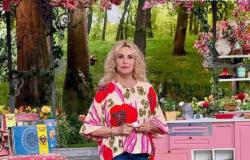«Hast du Platz für funf Leute?» Malika Ayane asks the bartender, showing off excellent German. Outside the venue the background is the usual paleness of the German capital in the first shy days of spring, it rains intermittently, the sky above Berlin at the beginning of April. A few meters from our meeting point lives Blixa Bargeld, it is easy to meet the leader of the Einstürzende Neubauten in the streets of Mitte. In the area once home to the first improvised clubs in the basements, an old dance hall from the early twentieth century now looks in amazement at the Samurai Museum built across the street; in the next block, the last occupied house in the neighborhood observes the archi-star condominiums all around like a man condemned to death, while a few smoky jazz clubs still hide among contemporary art galleries and oyster bars.
«This square, these streets, the houses and the faces of the people have changed a lot since the first time I came here», says Ayane, «and it certainly makes my heart cry to see a luxury dealership where the Tacheles used to be. (historic social center of 9000 square meters vacated in 2012, ed), but I think it is also right that the present does not remain unchanged. That is, if I did the same things with the same attitude as the first time I came here we would have a problem”, he adds, recalling the love at first sight that has long linked her to the German capital.
«I was 18 years old, I wanted to be a musician, in Milan I played in the clubs next to the Monumental Cemetery. I worked as a receptionist in an office that sold land to build antennas, probably the least creative place in the world. I spent my first salary on the plane ticket: we didn’t have internet on our phones and I had to cross the whole city to go to the YAAM evenings”, he adds, speaking of the historic reggae outpost on the banks of the Spree, together with the iconic Holzmarkt 25, the only survivor of the area near Ostbahnhof, cradle of Berlin clubbing in the early 2000s, today known as East Side Gallery. «I discovered that that world was really possible, that wherever I went there was music, anyone could be whoever they wanted». And again, the “knickknacks” of Kottbusser Damm, the tangos of the Argentine taverns or the improvised concerts in the clubs of Skalitzer Straße, «because techno is fine, but Berlin is also much more: a city in which opposite worlds live in harmony» .
Photo: Michele Piazza
Malika could go on for hours talking about her life in the city: «Now I live here permanently, I bought a house, but I have been commuting to Italy for ten years. I lived in Schöneberg, Prenzlauer Berg… then I started scrounging apartments from friends, without shame.” An image very distant from the artist who trained between the Milan Conservatory and the La Scala choir, a story that we never thought we would hear from the elegant voice of the five Sanremo artists. Almost a Doppelgänger, to stay with the German, protagonist of his new single Upside downout on April 12: a self-portrait of his own identity and his own contrasts, almost a mirror of his life in Berlin, “an invisible city, which disappears if you have the light on”, he sings in the song.
«Wir möchten zwei Beer, cleats» he asks the waiter who arrived to take the orders. It’s 6.30pm, it’s practically dinner time here and the Berlin aperitif has started a while ago, we can start with the interview.
In the first verse of your new single you sing: “In another season I would have said magnificent […] I wouldn’t rush into specifics, or dig slowly to the bone.” There seems to be a strong sense of urgency, of reclaiming an identity.
When we started writing this series of songs, which this is part of Upside down, I realized that it was time to do what I want, to go straight, without wasting time trying to please everyone. I understood that a song becomes important for those who listen to it only if you do it with honesty. If someone doesn’t get along with you, they won’t get away with you, and that’s okay, they just move on by continuing to do what we like. The song tells about who I am today. In these 15 years of publishing I have learned to free myself from the fear of making mistakes.
How much did Berlin influence this path you talk about in Upside down?
A lot, this city has helped me free myself from many pressures that fortunately don’t exist here. Wherever I go I never feel judged, if someone approaches me it’s because they think I’m interesting, not because of what I’ve done. Here I had the time to discover that I am much more than what I show to the public. Although I’m very sociable, I’m also very introverted, so sometimes I come across as bitchy or cold, but it’s a defense. In Berlin I can stay in a place all day, go from coffee time to closing, and there will never be anyone who makes me feel uncomfortable. Although the city has changed a lot in these ten years, its soul remains the same, and I continue to discover new pieces of it, with the same amazement as the first time, with the same enchantment, even if more moderate. I do the same thing with myself, accepting my changes without judging. An attitude towards life which is also the meaning of Upside down: I continue to build my contours without ever feeling out of place, while remaining myself, with my good manners (laughs).

Photo: Michele Piazza
In Milan instead?
I come from the outskirts of the city, I went to listen to bands in community centres, it was easier to find your own dimension, your own parallel identity, even if you were penniless. Today we play at the metropolis, but Milan remains a small city. You are always subjected to a gaze, not necessarily severe, but which cannot help but be judgmental. I lived for years worrying so much about being able to go out for a beer with friends without the “what kind of person are you? And the children?”. I felt the pressure of always having to perform, which then makes you feel alone, even if surrounded by people. Here, however, I found a very healthy existentialism, a solitude that never hurts, on the contrary.
You talk about it in the second verse of Upside down“a sandcastle on a free beach, a glance while you’re shopping”.
You notice it when you enter a bar, you can find people at any time reading about their own business and then starting to talk to strangers. A solitude that makes sense, because it means serenely accepting being a speck, getting lost among people, and I think getting lost is a wonderful thing. I find it right to take the time to dig inside, especially in a world that is increasingly faster. How do we want to live the time we have available? Do we want to continue looking for the perfect frame for our performance image, or do we go to the bottom, even holding our breath, even crashing with all the strength we have? I find it a wonderful possibility, and whoever has it should exploit it to the end.
“I learned to go under, when there’s no air”, as in the refrain of your new single.
When I started my career, rigor was required especially from young artists. You couldn’t go to Sanremo to be whimsical, otherwise you would never have been taken seriously. You had to stay inside a box, but at the same time you weren’t sure that those already laid tracks would take you somewhere. I like that today these tensions have eased. Today you can participate in the Festival even if you can’t sing perfectly, and that’s okay. When I started it would have been unthinkable.
What is your relationship with Italian music and the scene now that you live abroad?
I’m a little disappointed that, when we talk about Italian music, we only mean the kind that plays on the radio and makes numbers. Just as radios help mediocre songs become hits, it would be nice if the same space was given to all the beautiful music that exists down there. Sometimes we are so inside the vortex that we get sucked into it and start wasting time on things like “that interview turned out badly”, “that piece doesn’t have enough streams”, “who knows what the followers will think if I do this”… and I think that getting out of certain dynamics, even geographically, helps to understand what is really important. What matters is what makes you happy and honest: concerts, for example, always save us.
By the way, the tour starts in a few months, the first date is set for Trento on November 10th. What is the relationship with your audience when you return to Italy?
I can only see the beautiful, essential part of what I do: talking to the people who come to listen to me, hearing about those who have fallen in love with The first beautiful Thing, of those who have had children, or of those who have broken up and now can no longer listen to that song. When it happens I feel an enormous gratitude, which no number or no good interview can match. We always come back to what makes you make sense of the years you have available: finding serenity. Being able to do this is a gift, and those who succeed must share it. Give the gift of serenity, and beers (raises a toast).
So what, Prost!

Photo: Michele Piazza
Tour dates:
10 November Trento – Santa Chiara Auditorium
13 November Turin – Colosseum Theatre
15 November Milan – Dal Verme Theatre
16 November Mestre (VE) – Toniolo Theatre
18 November Bologna – Celebrations Theatre
23 November Spoleto – Teatro Nuovo Menotti
27 November Florence – Puccini Theatre
29 November Senigallia (AN) – La Fenice Theatre
30 November Rome – Auditorium Parco della Musica
3 December 2024 Naples – Augusteo Theatre








